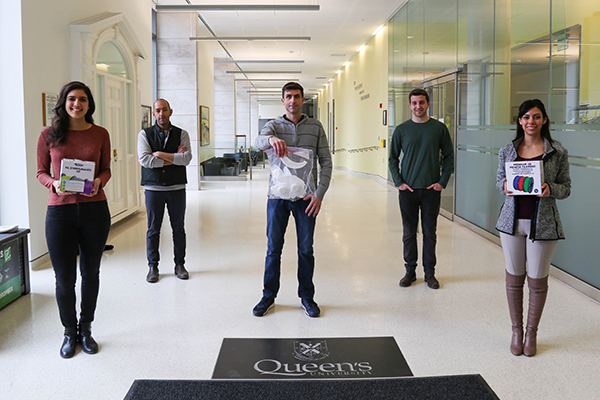A team effort to help protect healthcare workers
March 25, 2020
Share

A team of Queen’s and Kingston community partners are working together to help provide Personal Protection Equipment (PPE) for healthcare professionals working on the frontlines of the COVID-19 pandemic.
The team is a diverse group, bringing together Queen’s faculty members, medical students and medical residents, university students, and staff, as well as partners such as St. Lawrence College, Kingston Frontenac Public Library, and Kingston residents. All are donating their time and 3D printers to manufacture PPE, such as masks and face shields.
The equipment being manufactured is not intended to replace current masks and face shields but would act as a reserve in case supplies were to run out and there were no other options. The prototypes have been approved by KHSC for this purpose.
Hailey Hobbs, an assistant professor at Queen’s and critical care physician at Kingston Health Sciences Centre, initially put out a call on social media and quickly received a number of replies from people who were working on similar projects or ready to provide support.
The first to respond was Jeremy Babcock of the School of Medicine’s Clinical Simulation Centre who quickly got to work printing PPE prototypes from the designs Dr. Hobbs had found. He was then contacted by a group of students from the Queen’s School of Medicine – led by Cesia Quintero, Matt Snow and Megan Singh – who had the same idea and were ready to join the effort.
That was just the start.
“Honestly, I didn't really think that this would take off the way it has. I follow other critical care/intensive care doctors from around the world on Twitter, and with the COVID-19 outbreak I was checking it frequently to keep up to date on what was happening elsewhere in the world,” Dr. Hobbs says. “I found a tweet from Boston about a doc interested in making 3D printed PPE and I thought it was an interesting idea so I tweeted to the Queen’s community asking if there were any 3D printers on campus. I received several answers within 30 minutes and from there things have really snowballed.”
The medical students and residents have been the feet on the ground helping get the word out about the project and picking up printers loaned out by groups such as the Kingston Frontenac Public Library. They are also leading the work to assemble the PPE. Volunteers to help with the assembly work are welcome.
“The medical school community, as well as the Kingston community at large, have come together in a very beautiful way,” Quintero says. “We started over the weekend with three printers and five people, and it’s quickly snowballed to over 50 printers from various institutions, including Queen’s University, St. Lawrence College, the Limestone District School Board, Kingston Frontenac Public Library, as well as many, many individuals across the province who own their own printers, and who have been donating their time and material. Currently there are more than 70 people involved in organizing, printing, assembling and collecting the products at this point, and these numbers are growing quickly.”
The project gained further momentum after connecting with SparQ Studios, a makerspace supported by Dunin-Deshpande Queen's Innovation Centre (DDQIC), that had five 3D printers and the know-how to manufacture the PPE. SparQ Studios has since become the production hub.
“I am proud with our community. Users of SparQ have volunteered their personal printers and the Alma Mater Society helped me reach more people,” says Connor Crowe, director of SparQ Studios.
There continues to be an open call for more 3D printers that can either be loaned or used at home.
Overall, much has been accomplished in a short amount of time thanks to the dedication of all those involved.
“The response has been incredible – every day we receive emails from different groups interested in helping or learning from what we are doing to make PPE for their own hospitals,” says Dr. Hobbs. “It’s just been wonderful to know that so many different groups in the community are supportive and willing to help out in any way that they can. It really makes you realize how many great people there are in Kingston and how important it is to help each other in tough times.”
Anyone interested in loaning their 3D printers or printing PPE from home can email the group. Donations of filament and other supplies are also welcome.
Donations of surplus personal protective equipment and hand sanitizer to KGH and Kingston Community Clinics can be made via Anna Curry at PPEKingston@gmail.com.
For those looking to make a financial donation a GoFundMe page has been set up.